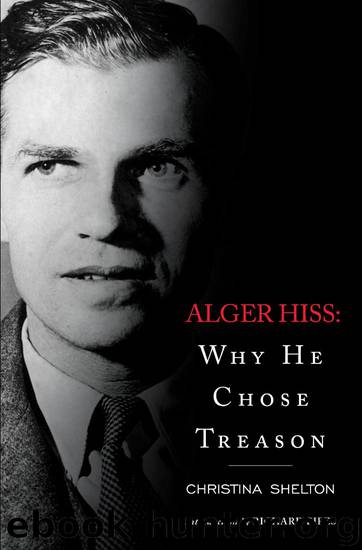Alger Hiss by Christina Shelton

Author:Christina Shelton
Language: eng
Format: epub
Publisher: Threshold Editions
PART THREE
#xa0;
Accused and Convicted
XI.
THE CASE
#xa0;
Hiss: Chambers Was Able to Carry Out Forgery by Typewriter
#xa0;
DURING THE CONGRESSIONAL hearings, the grand jury sessions, and the two perjury trials (1948–50), referred to collectively as “the case,” Alger Hiss received support from two Supreme Court justices, former first lady Eleanor Roosevelt, top-level government officials, and leading lights in the worlds of academia and journalism. Influential journalists Walter Lippmann, James Reston, Joseph Alsop, and Marquis Childs of the St. Louis Post-Dispatch, as well as the New Yorker and the New Republic, were all Hiss supporters. The “enlightened,” the “best people,” and the “powerful” defended Hiss, such as Dean Acheson, John Foster Dulles, and Supreme Court justices Felix Frankfurter and Stanley Reed. 1 Acheson, Truman’s secretary of state, insisted that he would not “turn his back on Alger Hiss.” 2 These otherwise honorable and patriotic men had a sense of loyalty to someone of their own class that prevented them from viewing Hiss objectively. President Truman weighed in as well—he declared that the whole Hiss affair was a Republican-plotted “red herring.”
Notably, several of Hiss’s former employers refused to provide character witness: Jerome Frank (AAA), Francis Sayre (assistant secretary of state), former secretary of state James Byrnes, and Stephen Raushenbush (Nye Committee). 3 The daily press was divided rather evenly, while the Hearst and Scripps-Howard syndicates were pro-prosecution. 4 The two protagonists were Whittaker Chambers, a former Communist operative who claimed among his friends a New Orleans prostitute named One-Eyed Annie; and Alger Hiss, the cool, well-bred Harvard Law School graduate and secretary to Oliver Wendell Holmes Jr. 5 Whittaker Chambers gave his first public testimony about some of his former Communist activities in the 1920s and 1930s during the August 3, 1948, hearing before the HUAC. This testimony set in motion a nasty and caustic national debate.
The case dominated the front pages for two years. Many books and hundreds of articles have been written about the political background and external issues and events that were occurring while the Hiss case unfolded. For example, who was manipulating the case for personal political advantage; what were the political agendas and ambitions of some individual members on the HUAC; how were the critics and supporters of the Truman administration and his policies using partisan politics during the presidential election year of 1948; who was behind the pre-McCarthy hyperbole that encouraged fear of Communist infiltration; how did the Elizabeth Bentley and Judith Coplon espionage hearings cause more alarm; what were the consequences of the Rosenbergs stealing U.S. atomic bomb information and providing it to the Soviet Union; what was the impact of the deteriorating situation with the Soviet Union; how did the Yalta “sellout” play into the story; who was responsible for Stalin’s consolidation of power in eastern and central Europe; the Berlin Blockade; who lost Poland; who lost China. The list is long. While it is a given that these political events were swirling around the case and to various degrees affecting it, this chapter nonetheless will focus on
Download
This site does not store any files on its server. We only index and link to content provided by other sites. Please contact the content providers to delete copyright contents if any and email us, we'll remove relevant links or contents immediately.
The Secret History by Donna Tartt(19089)
The Social Justice Warrior Handbook by Lisa De Pasquale(12190)
Thirteen Reasons Why by Jay Asher(8910)
This Is How You Lose Her by Junot Diaz(6887)
Weapons of Math Destruction by Cathy O'Neil(6280)
Zero to One by Peter Thiel(5802)
Beartown by Fredrik Backman(5754)
The Myth of the Strong Leader by Archie Brown(5508)
The Fire Next Time by James Baldwin(5446)
How Democracies Die by Steven Levitsky & Daniel Ziblatt(5219)
Promise Me, Dad by Joe Biden(5153)
Stone's Rules by Roger Stone(5088)
A Higher Loyalty: Truth, Lies, and Leadership by James Comey(4964)
100 Deadly Skills by Clint Emerson(4925)
Rise and Kill First by Ronen Bergman(4789)
Secrecy World by Jake Bernstein(4753)
The David Icke Guide to the Global Conspiracy (and how to end it) by David Icke(4720)
The Farm by Tom Rob Smith(4513)
The Doomsday Machine by Daniel Ellsberg(4490)
